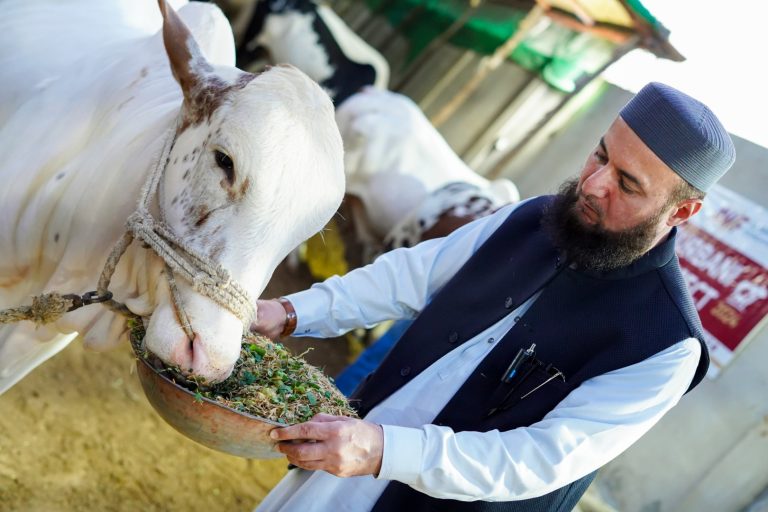The blessed month of Dhul Hijjah brings one of the most anticipated festivities for Muslims – Eid Al-Adha, highlighting the spirit of sacrifice, devotion to Allah’s will, and compassion for others. In addition to following the Sunnah of Hazrat Ibrahim (AS), this occasion teaches us the meaning of kindness and helping those in need. As Qurbani 2024 is approaching, let’s understand the significance of this month and make all of them a part of celebrations, who cannot afford to offer this obligation.
Qurbani 2024: Understanding Qurbani’s Meaning and Its Significance
Unlike Eid al-Fitr, which is celebrated after a month of fasting, Eid al-Adha has a history that goes back to the Prophet Ibrahim’s (AS) sacrifice for Allah’s will. The month of Dhul Hijjah marks two important events: the pilgrimage of Hajj and the Qurbani, which reflect faith, willingness to surrender to Allah’s will, and harmony in the Islamic community.
As the Holy Qur’an reminds us,
“If you love Allah, then follow me, and Allah will love you and forgive you your sins. And Allah is Forgiving and Merciful.” (Qur’an 3:31)

This reference truly translates the Qurbani meaning and its essence. By participating in sacrifice, you demonstrate your love for Allah and His Messenger, and in return, you receive abundant forgiveness and mercy.
What is Qurbani?
For all those looking for What is Qurbani, it is an annual animal sacrifice following Sunnat-e-Ibrahimi (AS). At the time of slaughtering, Allah (SWT) sent down a ram to be offered in Hazrat Ismail’s (AS) place. So, to commemorate this miracle, adult Muslims are eligible to pay Zakat, give Qurbani in the name of Allah (SWT), and distributing the meat to those who need it the most. This year, Qurbani 2024 brings us an opportunity to celebrate the occasion by sharing happiness through sacrificial meat with all those well-deserving.
Significance of Qurbani
The practice of Qurbani in Islam is highlighted in both the Quran and Hadith. In the Quran, the story of Prophet Ibrahim’s willingness to sacrifice his son is mentioned in several places, including in Surah As-Saffat (37:99-113) and Surah Al-Anbiya (21:101-107).
In Surah Al-Hajj (22:34), Allah says,
“For every nation We have appointed a rite (of sacrifice) that they may mention the name of Allah over the beast of cattle that He has given them for food. And your God is One God, so to Him submit. And, [O Muhammad], give good tidings to the humble [before their Lord].”
According to a Hadith: The Prophet (peace be upon him) said,
“Whoever gives a gift of a milch (pregnant) she-camel, or a cow or a ewe as Qurbani (sacrifice) on behalf of himself or on behalf of his family, his good deeds will be accepted (by Allah) on the Day of Judgment.” (Sunan Ibn Majah, Book 27, Hadith 3172)
Every good act is rewarded abundantly during the month of Dhul Hijjah and so, Qurbani is one of the greatest deeds obligated to every sane Muslim. The Prophet Muhammad (peace be upon him) said:
“No good deeds done on other days are superior to those done on these (first ten days of Dhul Hijjah)” (Ibn Majah).
During this month, Muslims are encouraged to engage in acts of charity, visit the sick and the needy, and help the less fortunate apart from giving Qurbani to seek Allah’s blessings.

How Muslims Perform Qurbani?
Muslims around the world perform Qurbani on the 10th day of Dhul Hiijah. Every sane Muslim having means to give Qurbani should fulfill this obligation. This Qurbani 2024, make sure to follow these rules according to Shariah:
Instructions for Qurbani 2024
The sacrificial animal (sheep, goat, cow, buffalo, or camel) must be in good health.
- The age of sheep and goats must be at least one year.
- The age of cows and buffalos must be at least two years.
- Purchase camels of at least five years of age
While preparing to slaughter the animal, be sure to sharpen the knife to avoid making it a painful suffering. Don’t sharpen the knife in front of the animal and shouldn’t be slaughtered in front of another animal.
Give Your Qurbani to AWF
As Qurbani 2024 is nearing, it is the best time to book an animal for sacrifice to avoid any last-minute haste. Like every year, Al-Wahab Foundation is on the front lines to ensure that your Qurbani reaches the right destination. AWF’s Qurbani Campaign is based on transparency, from bookings to slaughtering animals and distributing meat among the most deserving. For booking and details about AWF Qurbani, visit our website https://alwahabfoundation.org/all-appeals/qurbani/ or call us at 020 8903 8944.

